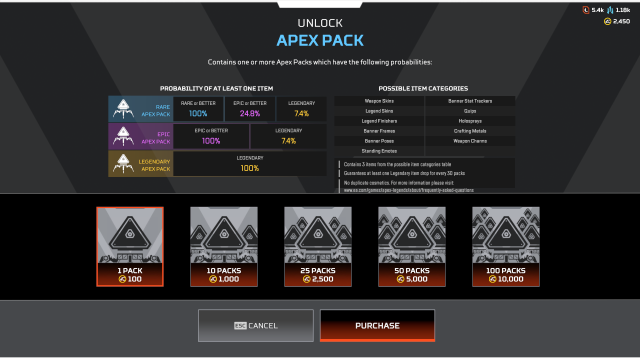A new set of guidelines in the U.K. was recommended by the Association for U.K. Interactive Entertainment on July 18 and it targets one of the most controversial mechanics in gaming today: loot boxes.
The guidelines talk about potential restrictions and regulations regarding loot boxes in video games and provide 11 “industry principles” that developers should adhere to.
- “Make available technological controls to effectively restrict anyone under the age of 18 from acquiring a loot box without the consent or knowledge of a parent, carer, or guardian.”
- “Drive awareness of and uptake of technological controls.”
- “Form an expert panel on age assurance in the games industry.”
- “Disclose the presence of loot boxes prior to purchase.”
- “Give clear probability disclosures.”
- “Design and present loot boxes in a manner that is easily understandable.”
- “Support the implementation of the video games research framework.”
- “Continue to tackle the unauthorized external sale of items acquired from loot boxes.”
- “Commit to lenient refund policies.”
- “Advance protections for all players.”
- “Work with the U.K. government and other relevant stakeholders to measure the effectiveness of these principles following a suitable implementation period of 12 months.”

One of the suggested principles has to do with “technological controls,” which essentially refers to the control a person has over the technology they’re interacting with. In relation to loot boxes, the principle suggests that anyone under the age of 18 should be prohibited from acquiring a loot box without the consent of a parent or guardian.
Another principle deals with disclosing the presence of loot boxes in a game. This principle recommends that developers disclose if their game has loot boxes before players are allowed to download or purchase the title so the player can make an informed decision on whether they want to interact with a game that has such mechanics.

Probabilities are also a highlight of these principles. The guidelines suggest that all loot boxes should present the probabilities of items that are contained in them. This is another way to give a player the chance to make informed decisions regarding the possible purchase of a loot box.
Another aspect of these guidelines to consider is real money trading (RMT), which has been a problem in the gaming sphere because it can break the economy of a game. Real money trading happens when you pay real money to receive an item that was acquired from a loot box. This essentially skips the probability part of the loot box and can earn players a lot of money, especially if the demand for that specific item is high. One principle targets this, which means developers are now advised to go after these kinds of practices.
Another principle attempts to safeguard parents and guardians from unauthorized purchases made by their children. This could make it easier for parents and guardians to refund their money if they can prove the transaction was unauthorized.
Loot boxes have been a controversial topic since they were popularized by games such as CS:GO and Overwatch. Since then, the presence of loot boxes has seemingly infiltrated almost every nook and cranny of the games industry.
Related: EA insists that players ‘love’ loot boxes in Ultimate Team, confirms packs will return in FIFA 23
It has come to the point where several lawsuits have been filed due to the predatory practices of the mechanic. In May 2023, Nintendo received a lawsuit due to the loot boxes in its game Mario Kart Tour. A year earlier, Blizzard Entertainment was hit with a class-action lawsuit due to the card packs in its digital card game Hearthstone.
It is unclear at this time how much of an impact these new guidelines and recommended principles will have on the current implementation of loot boxes in the gaming scene.






Published: Jul 19, 2023 11:18 am